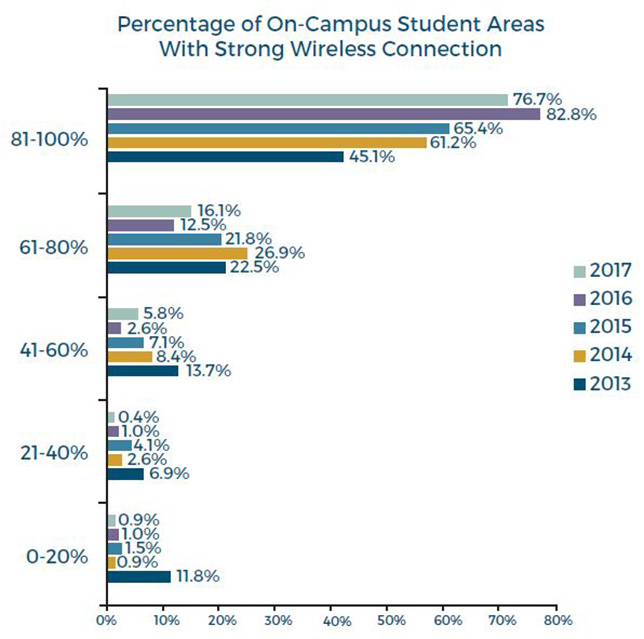Wireless Demand (and Supply) Just Keeps Going Up
- By Dian Schaffhauser
- 03/20/17
It's no wonder students expect comprehensive WiFi when they come to campus. After all, that has become the "ResNet" norm on most campuses. Seventy-seven percent of colleges report WiFi throughout 81 percent to 100 percent of their campus student areas. On top of that, 70.5 percent of campuses dedicate at least a gigabit or more per student for ResNet activities; 27 percent offer as much as 7Gb or more. However, while "robust" wireless connectivity is on the rise in academic areas, there's been a slight decline in social areas.
Those are some of the findings in this year's "State of the ResNet" survey done by the Association for College and University Technology Advancement (ACUTA) and Association of College and University Housing Officers-International (ACUHO-I). The annual report analyzed responses from 450 surveys representing 320 schools.

Source: "2017 State of ResNet," from ACUTA and ACUHO-I, March 2017.
This year, comprehensive wireless coverage saw a 6 percent dip from last year's 83 percent of campuses that reported strong wireless connectivity over at least 81 percent of the campus. However, institutions saw an increase from 65 percent to 70.5 percent in the number of institutions committing at least a gigabit per student for ResNet traffic. Nearly three-fourths of campuses let residents connect an unlimited number of devices to the ResNet (a 6 percent increase from last year).
To cover the costs of this provisioned technology, more schools have increased or are considering increasing student or user tech fees. Right now, according to the report, 61 percent of schools levy a general technology fee. Forty percent of institutions have merged network services with other IT services to save on ResNet costs.
Nearly three-quarters of institutions are considering plans for "cellular augmentation" to accommodate "seamless wireless coverage," the report stated. More than seven in 10 schools (72 percent) are considering options for boosting residential cellular reception on campus, up 14 percent from last year. Among their choices: in-building DAS (referenced by 21 percent of respondents), outdoor DAS (mentioned by 15 percent) and outdoor cellular sites or towers (cited by 13.5 percent).
"Colleges and universities are amongst the most demanding wireless environments today. Over the past five years of this study, bandwidth demand by students has been increasing, and bandwidth availability and the delivery to satisfy those demands have also increased," the report stated. The main driver: Good WiFi is important in "attracting and retaining on-campus students" and keeping students happy, all of which has an impact on "the university as a whole."
The complete report, being formally released this week during the 2017 ACUTA Conference and Exhibition in Chicago, is available on the ACUTA website here.
About the Author
Dian Schaffhauser is a former senior contributing editor for 1105 Media's education publications THE Journal, Campus Technology and Spaces4Learning.